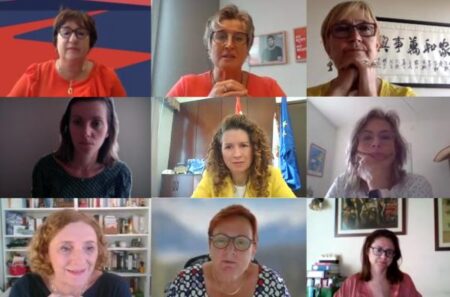Last month, PES Women warned the crisis in Afghanistan threatens the lives and rights of women and girls in the country.
Today the Executive exchanged with an Afghan activist and scholar about the situation in the country and conflict zones in general.
PES Women President Zita Gurmai said:
“The current crisis in Afghanistan is yet another example of how women are always among the first affected in conflicts but the last whose needs are addressed. Women constitute a high percentage of civilians killed, wounded or assaulted in conflict zones and bear the heaviest burden when it comes to inequality and poverty. Of the 71 million people currently displaced from their homes globally, 80% are women and children. Rape, forced marriages and other attempts to curtail women’s human rights and their freedom tend to increase in times of crisis. While all humans suffer during war and conflict, a crisis is never gender-neutral; women’s bodies and lives are used as weapons to terrorise and punish opponents in wars. As feminists and progressives, we cannot stand for this, and the Afghan crisis has only made the global situation for women more untenable.”
At the meeting PES Women expressed full support to the proposal by the Group of the Socialists and Democrats in the European Parliament to nominate a collective of Afghan women for the 2021 Sakharov Prize for Freedom of Thought. Women are showing extraordinary courage by standing up to Taliban oppression, both in person and online and the price would send a strong message to the women across the country who are claiming back their rights and freedom.
PES Women members made clear that it is crucial to assess the specific needs of women who want to leave their country, but also specifically those who want to stay. Next to immediate humanitarian aid, it is important to build a functioning socio-economic system that provides a good livelihood. Women in conflict suffer a multidimensional crisis, including displacement, exclusion and poverty that must be addressed holistically, including through mechanisms that ensures assistance on the ground and safe passage for those at risk.
Zita Gurmai added:
“Through the global community, supported by the UN Security Council Resolution 1325 on Women, Peace and Security, and via the Gender Action Plan III, we as the European Union must be at the forefront of prioritising women and girls’ safety during conflicts. Sufficient, rapid and targeted aid for women must be made a priority. Humanitarian assistance should be dedicated to creating safe spaces, improve women’s economic independence, counteract gender-based violence and protect human rights, including girls’ right to education and access to psychological help especially for the younger generation. Fair and gender-sensitive asylum procedures are also crucial, as is support for humanitarian NGOs on the ground. We must build bridges of solidarity, communication and action.”
PES Women stands in solidarity with women in conflict zones all over the world and will continue to push for their voices and experiences to be recognised. Targeted action and a comprehensive strategy that takes women’s needs into account is key.



